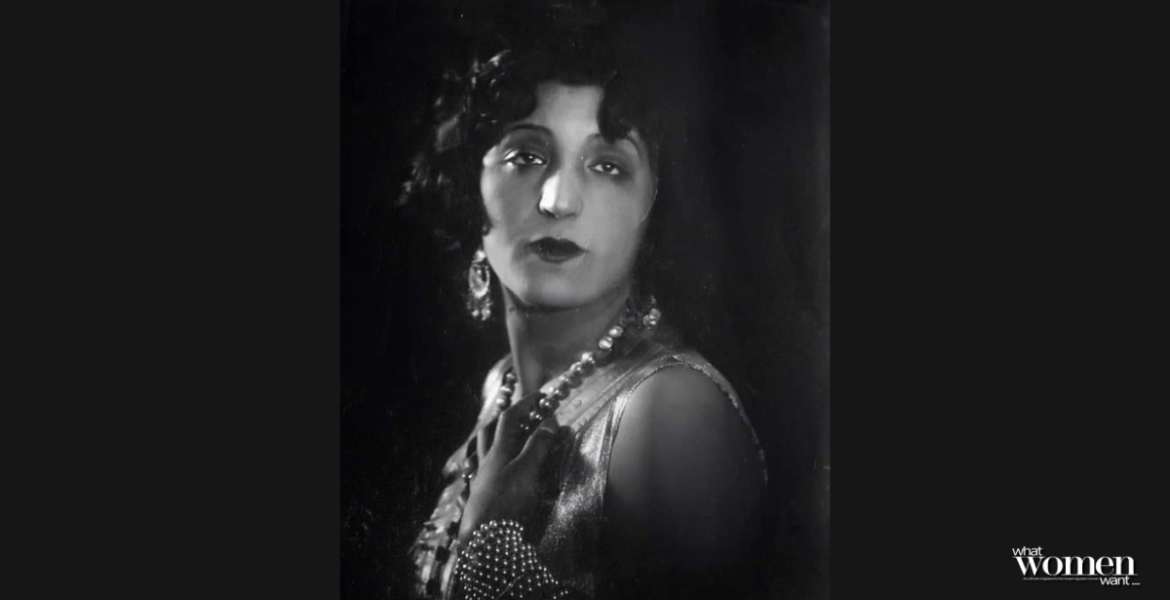Aziza Amir, originally named Mufida Ghuneim, was born in Alexandria on the 17th of December, 1901 to a poor family originally from Damietta. Her father tragically died just fifteen days after her birth. So, her family moved to Cairo’s Khayrat Street, one of Egypt’s most vibrant neighborhoods. Aziza grew up with a passion for the arts. If she was not imitating her favorite actresses in front of mirrors, she was roaming the shops for pictures of her most beloved performers. You can read about Aziza Amir and other admirable women like her in Banat Al-Ayam Deh.
Dreams, Failures, and Triumphs
Her dream began in 1923, when she went on a trip to Europe. There, she met filmmaker D. W. Griffiths, who had directed the infamous film, Birth of a Nation–one of the first feature films ever made. It is claimed that he offered her a part in one of his films. She also applied for a role with the Gaumont Company in Paris but had not been accepted to join. However, that did not stop her from pursuing her dream. Yusuf Wahbi, the founder of Ramsis Theatre troupe, whom she sent a personal letter asking for an audition to be in one of his plays, he did not only give her an audition but also her first professional role.
Wahbi was also the one to give her the name she’ll be remembered most by, Aziza Amir. Her first stage appearance was in the play Al-Jah al-Muzayyaf (The Fake Status), which launched Aziza to stardom. From that role alone she became the highest paid actress in Egypt at the time, with the unparalleled fee of 30 pounds per month.
Rough Beginnings
As for her cinematic journey, it started with a little of a tumble–that eventually became one of her greatest achievements. A lot of directors did not want to work with her. At last, a Turkish art director named Widad Orfi signed a contract with her to write and direct a film called Nida’ Allah (God’s Call). However, both of them started to encounter a lot of disagreements and disputes with each other throughout the production phase. When the movie was screened for some close friends, director Mohammed Karim’s blunt advice to Aziza was to “Burn it.” Aziza would eventually terminate her contract with Orfi and reboot the project. Now, under the direction of Stephan Rosti and produced by her newly founded film company Isis Film.
History in The Making
Aziza was determined to get it right this time. She turned her home in Al Bergas street in Garden City to a film studio to shoot and develop her movies. A year later she would establish Heliopolis Studio. Both of her studios predated the famous ‘Studio Misr’ founded by Talaat Harb in 1937.
Leila–or Nida’ Allah rebooted, was the first locally funded and executed Egyptian silent feature film, which marked the official birth of Egyptian cinema. It debuted at the Cairo Metropole cinema on the 16th of November, 1927. Becoming a national breakthrough, deeply loved in the eyes of all Egypt. Many folks of elite society attended the premiere and amongst them was Banker Talaat Harb, who had previously advised Aziza to give up on her “impossible dream.” He went on to congratulate her by saying “You have accomplished what no man has ever accomplished”. From that moment onward, Aziza was dubbed the mother of Egyptian cinema.
Fierce Filmography
Aziza’s roles most often embodied strength in the face of sorrow, spiritual persistence and acceptance of what fate brings you. She was not afraid to mix politics with her art. She was in fact one of the first to tackle the Palestinian cause in Arab cinema, first with her film Fatat min Filastin (A Girl from Palestine, 1948), and second with Nadia (1949). Aziza expanded her filmography with some foreign films, including the French film The Tunisian Girl (1931) and Turkish films The Egyptian Author and The Streets of Istanbul both released in 1932.

